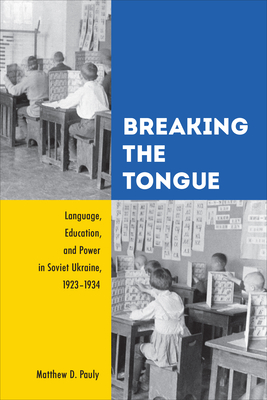Breaking the Tongue: Language, Education, and Power in Soviet Ukraine, 1923-1934

Breaking the Tongue: Language, Education, and Power in Soviet Ukraine, 1923-1934
In the 1920s and early 1930s, the Communist Party embraced a policy to promote national consciousness among the Soviet Union's many national minorities as a means of Sovietizing them. In Ukraine, Ukrainian-language schooling, coupled with pedagogical innovation, was expected to serve as the lynchpin of this social transformation for the republic's children.
The first detailed archival study of the local implications of Soviet nationalities policy, Breaking the Tongue examines the implementation of the Ukrainization of schools and children's organizations. Matthew D. Pauly demonstrates that Ukrainization faltered because of local resistance, a lack of resources, and Communist Party anxieties about nationalism and a weakening of Soviet power - a process that culminated in mass arrests, repression, and a fundamental adjustment in policy.
Descrierea produsului
In the 1920s and early 1930s, the Communist Party embraced a policy to promote national consciousness among the Soviet Union's many national minorities as a means of Sovietizing them. In Ukraine, Ukrainian-language schooling, coupled with pedagogical innovation, was expected to serve as the lynchpin of this social transformation for the republic's children.
The first detailed archival study of the local implications of Soviet nationalities policy, Breaking the Tongue examines the implementation of the Ukrainization of schools and children's organizations. Matthew D. Pauly demonstrates that Ukrainization faltered because of local resistance, a lack of resources, and Communist Party anxieties about nationalism and a weakening of Soviet power - a process that culminated in mass arrests, repression, and a fundamental adjustment in policy.
Detaliile produsului












